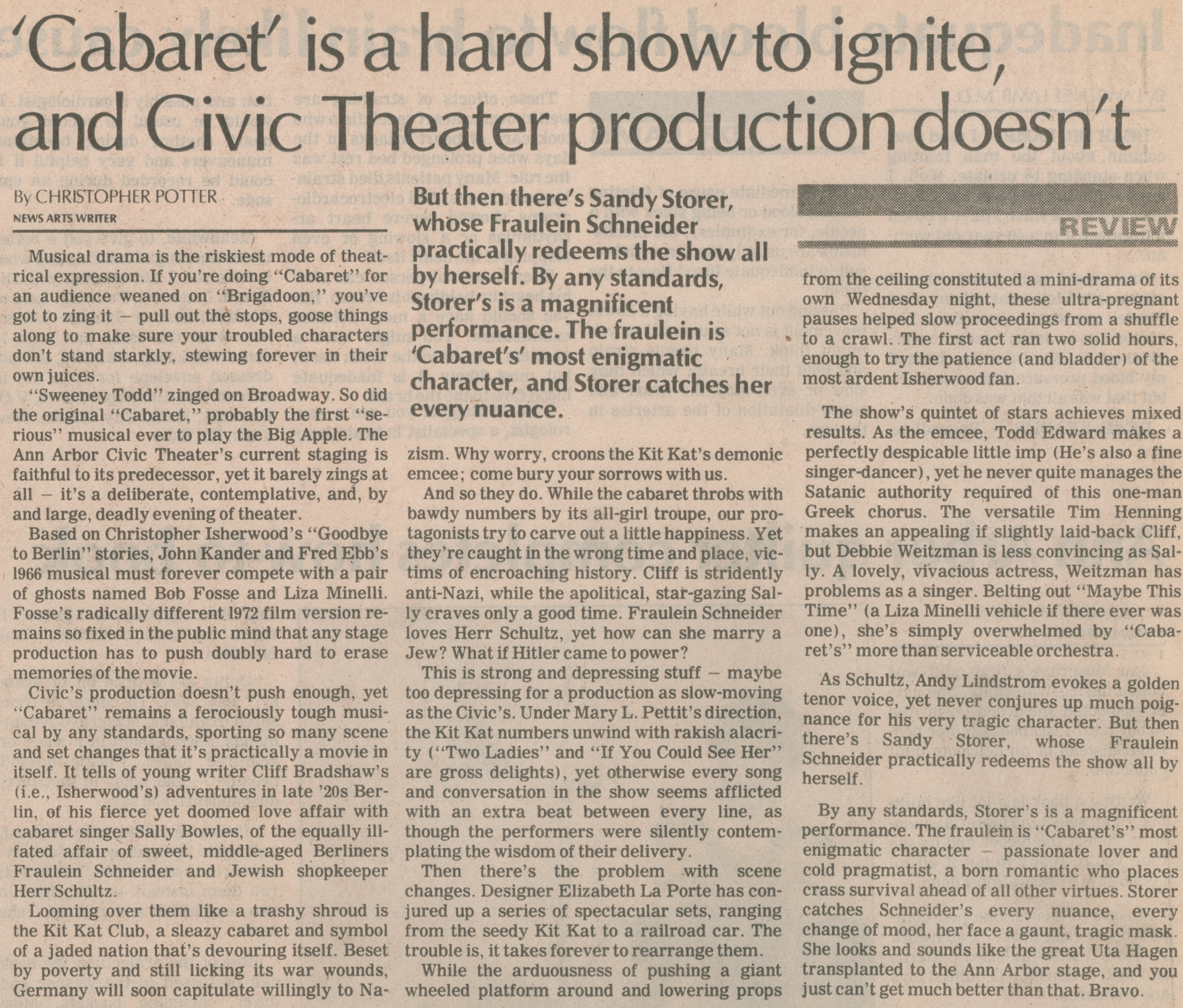'Cabaret' Is A Hard Show To Ignite, And Civic Theater Production Doesn't

'Cabaret' is a hard show to ignite, and Civic Theater production doesn't
By CHRISTOPHER POTTER
NEWS ARTS WRITER
REVIEW
Musical drama is the riskiest mode of theatrical expression. If you’re doing “Cabaret” for an audience weaned on “Brigadoon,” you’ve got to zing it pull out the stops, goose things along to make sure your troubled characters don’t stand starkly, stewing forever in their own juices.
“Sweeney Todd” zinged on Broadway. So did the original “Cabaret," probably the first “serious” musical ever to play the Big Apple. The Ann Arbor Civic Theater’s current staging is faithful to its predecessor, yet it barely zings at all — it’s a deliberate, contemplative, and, by and large, deadly evening of theater.
Based on Christopher Isherwood’s “Goodbye to Berlin” stories, John Kander and Fred Ebb’s 1966 musical must forever compete with a pair of ghosts named Bob Fosse and Liza Minelli. Fosse’s radically different 1972 film version remains so fixed in the public mind that any stage production has to push doubly hard to erase memories of the movie.
Civic’s production doesn't push enough, yet “Cabaret” remains a ferociously tough musical by any standards, sporting so many scene and set changes that it’s practically a movie in itself. It tells of young writer Cliff Bradshaw’s (i.e., Isherwood’s) adventures in late ’20s Berlin, of his fierce yet doomed love affair with cabaret singer Sally Bowles, of the equally ill-fated affair of sweet, middle-aged Berliners Fraulein Schneider and Jewish shopkeeper Herr Schultz.
But then there's Sandy Storer, whose Fraulein Schneider practically redeems the show all by herself. By any standards, Storer's is a magnificent performance. The fraulein is 'Cabaret's' most enigmatic character, and Storer catches her every nuance.
Looming over them like a trashy shroud is the Kit Kat Club, a sleazy cabaret and symbol of a jaded nation that’s devouring itself. Beset by poverty and still licking its war wounds, Germany will soon capitulate willingly to Nazism. Why worry, croons the Kit Kat’s demonic emcee; come bury your sorrows with us.
And so they do. While the cabaret throbs with bawdy numbers by its all-girl troupe, our protagonists try to carve out a little happiness. Yet they’re caught in the wrong time and place, victims of encroaching history. Cliff is stridently anti-Nazi, while the apolitical, star-gazing Sally craves only a good time. Fraulein Schneider loves Herr Schultz, yet how can she marry a Jew? What if Hitler came to power?
This is strong and depressing stuff - maybe too depressing for a production as slow-moving as the Civic’s. Under Mary L. Pettit’s direction, the Kit Kat numbers unwind with rakish alacrity (“Two Ladies" and “If You Could See Her” are gross delights), yet otherwise every song and conversation in the show seems afflicted with an extra beat between every line, as though the performers were silently contemplating the wisdom of their delivery.
Then there’s the problem with scene changes. Designer Elizabeth La Porte has conjured up a series of spectacular sets, ranging from the seedy Kit Kat to a railroad car. The trouble is, it takes forever to rearrange them.
While the arduousness of pushing a giant wheeled platform around and lowering props from the ceiling constituted a mini-drama of its own Wednesday night, these ultra-pregnant pauses helped slow proceedings from a shuffle to a crawl. The first act ran two solid hours, enough to try the patience (and bladder) of the most ardent Isherwood fan.
The show’s quintet of stars achieves mixed results. As the emcee, Todd Edward makes a perfectly despicable little imp (He’s also a fine singer-dancer), yet he never quite manages the Satanic authority required of this one-man Greek chorus. The versatile Tim Henning makes an appealing if slightly laid-back Cliff, but Debbie Weitzman is less convincing as Sally. A lovely, vivacious actress, Weitzman has problems as a singer. Belting out “Maybe This Time” (a Liza Minelli vehicle if there ever was one), she’s simply overwhelmed by “Cabaret’s” more than serviceable orchestra.
As Schultz, Andy Lindstrom evokes a golden tenor voice, yet never conjures up much poignance for his very tragic character. But then there’s Sandy Storer. whose Fraulein Schneider practically redeems the show all by herself.
By any standards, Storer’s is a magnificent performance. The fraulein is “Cabaret’s” most enigmatic character passionate lover and cold pragmatist, a born romantic who places crass survival ahead of all other virtues. Storer catches Schneider’s every nuance, every change of mood, her face a gaunt, tragic mask. She looks and sounds like the great Uta Hagen transplanted to the Ann Arbor stage, and you just can’t get much better than that. Bravo.